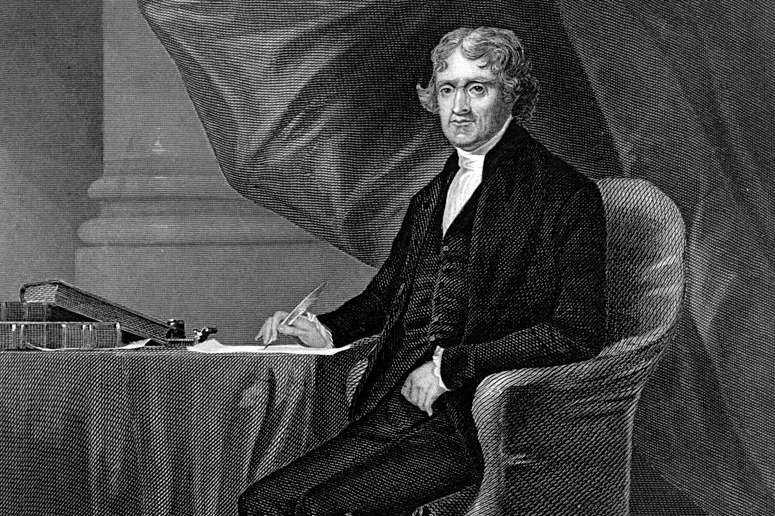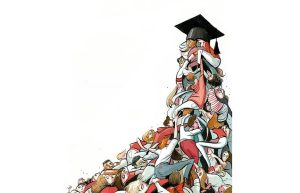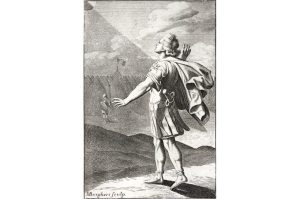Laramie, Wyoming
Historians of democracy know that the phenomenon was built upon two principal social structures: bourgeois commerce and popular education. The first developed during the Middle Ages and grew until eventually it replaced war as the means by which states and individuals acquired wealth; the feudal class gave way to the bourgeoisie. The second developed in the late 18th and early 19th centuries in North America, the United States in particular.
The two institutions were widely regarded as socially, morally, economically and politically complementary; necessary to the growth of a solid middle class, of capitalism and of republican government. Thomas Jefferson, who hated cities and distrusted the character of their inhabitants, thought a healthy, prosperous, virtuous and politically enlightened yeomanry was dependent upon the oil of commerce and on a literate and informed citizenry.
Jefferson and his philosophical colleagues in the political life of his day, and for a generation or two after it, were not mistaken in the republican value they placed on these things. Nor did they neglect to support and encourage the conditions that advanced them. The proof is found in many places, nowhere more convincingly than in the diaries, journals and letters of soldiers fighting on both sides in the War Between the States, when the American experiment in continental democracy was in danger of perishing from the Earth after seven decades, despite the best (and sometimes unconstitutional) efforts of the Stovepipe Hat in the White House to rescue it.
There is, indeed, a scholarly tome to be worked up by some earnest PhD candidate interested in discovering whether the generation that came of age in the 1850s and 1860s, having been raised in what was still chiefly an agrarian, small-town and provincial as well as — broadly speaking — egalitarian country, was not perhaps the most literate and best educated the United States has ever produced. If so, the thing is probably explainable by the fact that as the older commercial system was strengthened by the new industrial regime, an imbalance appeared between the social and political benefits a well-educated body of citizens produced for democratic society and the commercial ones it delivered to the national economy.
No one in Jefferson’s and Adams’s day suspected the contradiction between the two things. Democracy may equal commerce plus education in an early capitalist society. But in a late-capitalist, hyper-commercialized one of the sort toward which the United States has been moving since 1865, commercialism works relentlessly against an educated citizenry by distracting it from serious concerns. Popular knowledge is diluted and corrupted by the men of commerce who have a financial interest in making wisdom and intellectual effort appear simple for the purpose of marketing what they claim are shortcuts to them: learning and the arts made straightforward and painless for the mass man.
Consider, for instance, the growing difficulties the so-called educators have experienced for several generations now in teaching children at the lowest, most basic levels of pedagogy — reading, arithmetic, writing and spelling — where schoolmarms before the middle of the 20th century did not struggle.
As early as the 1950s, books with such titles as Why Johnny Can’t Read began to appear. To my knowledge, the geniuses at Columbia University Teachers’ College and similar institutions have never put poor or virtually nonexistent spelling skills among children — and even adults — down to the linguistic creativity of the wizards of the copywriting desks and the wallahs on Madison Avenue who for generations have relied on phonetic spelling to create brand names, thus turning made-up words or simply brute sounds into products — Kool-Aid, Kleenex, Waterpik and so on — they can register as trademarks. Almost no one in an almost wholly commercialized society thinks to ask why a child should be expected to distinguish the genuine spelling from the ersatz one: to recognize the difference between ‘pik’ and ‘pick’. Or between ‘Easy’ and ‘EeeZee’ — a barbarity of the sort endemic to demotic commercial-speak.
Consider further the commercial simplifiers, the redactors, the bowdlerizers and the vulgarizers of the classic texts in juvenile and adult literature, whether reprocessed for new print editions, for the cinema or for television. This abomination began after the Great War, chiefly with lengthy works for adults reduced and modified by the publishers — and with the Hollywood versions revised and even reimagined by their producers to appeal to the tastes of mass publics reduced to their lowest common denominator.
As a result, grown-up audiences have been deprived of the opportunity to experience, at the cost of some relatively slight mental effort, great works of literature as they came from the hand of their creators, or in conscientious translation to the screen. The young have been deprived too. For the latter half of the 19th century and through the first two-thirds of the 20th, literary artists of taste, education, skill, subtlety and, frequently, genius wrote works worthy of appreciation and admiration by both young and old. One thinks of the works of R.L. Stevenson, Jules Verne, H. Rider Haggard, Rudyard Kipling, C.S. Forester, Lewis Carroll, Beatrix Potter, A.A. Milne, Kenneth Grahame, C.S. Lewis, J.R.R. Tolkien, Laura Ingalls Wilder. Of these perhaps the majority have been appropriated, violated and despoiled by heartless commercial titans like Disney for the asserted benefit of children and young adults who nevertheless remain entirely ignorant of the great originals — even of the fact that these exist. This is the inevitable fate of literature in a society that views it as mere entertainment and a chance for financial profit rather than the principal source of wisdom and an understanding of all things human.
Classical Greece considered the proper study of man to be man. The modern commercial republic, imagining it to be the science of creating wealth and power, has destroyed education in the classical sense and replaced it with a system of technical training in the fields that produce both, while treating man himself as an accidental artifact — a mere mechanism — of nature.
In doing so, it also negates the philosophical basis on which the republican form of government was created, and upon which it depends. Republics have never lived by the commercial principle alone.


















